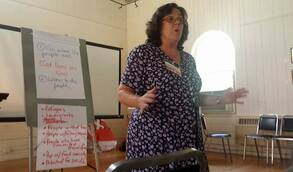 Liz teaching outreach strategies to church folk. (White woman in blue dress in front of an easel with writing.) Liz teaching outreach strategies to church folk. (White woman in blue dress in front of an easel with writing.) I read recently a pastor suggesting these roles for a pastor: Professional Speaker, Master of Ceremonies, CEO, Counselor, Fundraiser, Human Resources Director, Pillar of Virtue. While the writer is leaving ministry for many reasons, and points out many real problems with ministry, for me what was stood out was how different my list of roles is. Having a different list or roles would not solve the challenges he has faced. His experience is real. Many are sharing it because it speaks to their hearts. My experience of ministry is quite different than his. I too am a good “professional speaker” and while I’m uncomfortable with the title Master of Ceremonies, I’m a good, although quite informal, worship leader. I also do some counseling, although I’m not overwhelmed by my parishioners lives. The small size of my churches might explain that feeling, but I think it is mostly that I don’t see it as a primary purpose of my ministry. Beyond those two items, the rest of the list is simply not my calling as a pastor. For sure, I’m not a pillar of virtue. Of course none of us are, but most importantly, I do not hide my foibles and failures. I refuse this role when people try to hoist it on me. Most importantly, I’m not a CEO, fundraiser, or human resources director. At every church I’ve served, the board holds all those roles. At my first church I accidentally took over some of those roles, but I learned from those mistakes and have not done that since. I’m instead the in-house consultant. I give advice. I ask questions. I help the council and the congregation to imagine the future. I read legal documents and notice if there is weird language. I propose alternative ways of looking at the budget. I seek out grants. I ask where they see God in their work. I look for theological foundations to the work. Sometimes I grumble about their choices. But I am absolutely not in charge. Part of why I am not CEO is because I don’t buy the idea that it is the purpose of any church to grow in finances or in people. In fact I spend a lot of time helping churches to get off the bigger is better bandwagon. I do think church is a place to grow spiritually, and so spend a lot of time creating studies of biblical texts, theology, public discourse around faith, and more. Small numbers of people join me for those studies. I design worship, speak at council meetings, provide trainings, all with the idea that one of my roles is educator. And I think that church's primary role is to serve the community, so I spend time hanging out with people who are not in the church. On the top of my list of roles would be Community Organizer. A small part of my congregation joins me in that work. The thing that makes me consider leaving is the work that is over-the-top-impossible for me: Administration. Clerical work. Details. Emails. The bulletin. Finding artwork. The calendar. The to-do list. Help me Jesus! Like literally, please take these away! My list of roles: Community Organizer is most important, Educator is most fun. Although Worship Leader is most expected, it is not most important, but also it is where I get the most positive feedback. My roles as Consultant as most meaningful, and most focused on hope for the future. Clerical Assistant is the most annoying of my roles. I think what keeps me spiritually healthiest is when I remember I’m a Theologian. I don’t do much counseling, but I ask where God is in people’s lives. I don’t do much CEOing, but I ask how God is at work in the church. I don’t run outreach programs, but I search for God in the relationships we build. Not many people come to our faith formation activities, but I love the thrill of looking for God’s way together. Not enough church people are involved in our local outreach, but the work we do makes a difference in our community. I, like most clergy, am tired. It's a wide diversity of roles, and I can't be good at them all the time. I, like most working people I know, wonder if my work is where my heart is right now. I want a weekend off with my family. I want to prioritize my home. I have great sympathy for those who cannot continue the work they thought was their calling—whether that work is church work or not. For me, now, the roles fit my skills. I'd say more, but I've got to get the bulletin finished. What are your roles as a pastor?
1 Comment
 When I was in eighth grade I won the local science fair with my project Sliding Friction. I felt we hadn’t effectively used the scientific method in our classroom lab, so I redesigned the experiment to show how weight, surface area, and incline affect friction. People tell stories of very fancy equipment and high level experiments in science fairs, but what made me a winner is that I did each run 5 times, eliminated the highest and lowest readings, and graphed the results. I felt like a huge success. Later I realized that it was even a bigger win—eighth graders competed with grades 8 through 12. I had won against students who had much more science education than me. And I never entered another science fair. Sometimes success is the hardest thing to overcome. When your science fair project doesn’t win, we don’t call that a failure, although as a very competitive kid, I perhaps treated it as such. Every year I had entered, looked for the winning projects and asked, how could I do better. What would be the steps to making a better project? I checked out the notebook, and the display, and even what topics people chose for their winning projects. I asked “what is it that makes this a winner?” Each year I used my loss, my non-win, as an opportunity to learn. What was there to do with my win? How could I ever come up with an idea that was as good? How could I ever develop a project that compared. Race ahead to 2019. Over the previous year I worked my way up from walking a mile or two at 20 minutes per mile, to the end of September when I walked 14 miles at 18 minutes per mile. I was a walking machine! I got up at 5 in the morning for that 14 mile walk, but even more significantly, every week I got up 2 or 3 times a week to walk—2 to 3 miles on weekdays, and increasingly longer distances on Saturdays. When I started, my first 5K in under an hour was a huge success. I built up to 7 miles, 10 miles, 12 miles, and then 14. When my knee hurt I went to physical therapy, and unlike any other time in my life I did every exercise as directed, every day. I took part in a half marathon, celebrated with friends. And then I didn’t walk again. I didn’t do the short week day walks, and I didn’t do the longer weekend walks. My spreadsheet with times sits un-updated. I was proud of my success, but why couldn’t I keep going? In 2010 I decided I wanted to write a book. I started writing every day, with the idea that to be a writer I must spend my time writing. I enrolled in a PhD program, dropped out, found a Dmin program, wrote a thesis, took a writing course, wrote a book proposal, and in March of 2020 my book came out. I just kept doing whatever needed to be done to be the author of a published book. As part of my book proposal I suggested that I would write a weekly blog with additional stories from my research. I suggested that I would write articles in scholarly journals supporting the research in my book. I imagined that I’d keep writing. But I did not. Once the book came out I’ve never successfully written for even two days in a row. I write a blog post here and there, but I never get back into the mode of prioritizing writing as an integral part of my life. It seems like my life’s successes have all been the cause of, or at least the precursor to, continued failure. What do you think? |
My ThoughtsFor my organized thoughts, see my book Five Loaves, Two Fish, Twelve Volunteers: Developing Relational Food Ministries. In this spot are thoughts that appear for a moment--about food programs, mission, church, building community, writing, and whatever else pops into my head. History
January 2024
Categories
All
|
 RSS Feed
RSS Feed